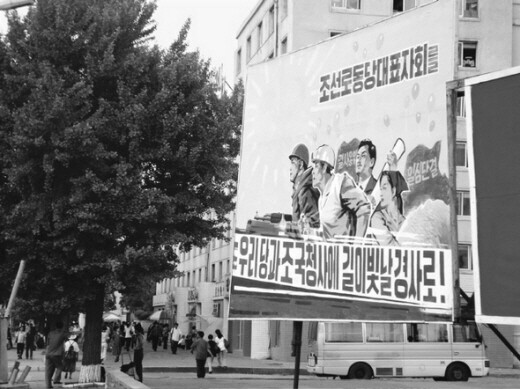hankyoreh
Links to other country sites 다른 나라 사이트 링크
N.Korea to release S.Korean fishermen

By Son Won-je, Writer
The announcement that North Korea would be repatriating sailors from the South Korean fishing boat Daesung has been interpreted as a fairly positive sign for inter-Korean relations. This is because it eliminates a stumbling block at the humanitarian level of inter-Korean relations. However, many observers have expressed that it is unlikely to significantly impact inter-Korean relations as a whole, as the sailors’ repatriation had been seen as only a matter of time.
Some analysts have suggested that the announcement, which comes thirty days after North Korea seized the Daesung’s crew on Aug. 8, may have been a response to recent South Korean expressions of the intent to provide aid for flood damages in the country. North Korea stated that the crew members infringed upon an exclusive economic zone in the East Sea.
The South Korean government has suggested sending 10 billion Won ($8.5 million) in emergency relief supplies in the name of the Republic of Korea National Red Cross as aid for flooding in North Korea, and has also hinted that it may permit private rice aid to North Korea as flood relief. This indicates that both North Korea and South Korea are exchanging “fairly positive signals.”
Analysts have also stated that the decision appears to have taken into account North Korea’s relations with its biggest ally, China, given that three of the sailors captured were Chinese. Some are offering the more positive analysis that this should be viewed as a continuation of a recent string of moves by North Korea such as Kim Jong-il’s visit to China and the freeing of U.S. detainee Aijalon Mahli Gomes.
“It looks like North Korea determined that now is the right time to repatriate the Daesung sailors, in light of the fact that the U.S. has also sent signals recently that inter-Korean dialogue is necessary for the sake of U.S.-North Korea dialogue and that public opinion in South Korea is calling for food aid to North Korea,” said former Vice Unification Minister Rhee Bong-jo.
In this case, since the detention was not something that could be prolonged indefinitely, North Korea selected a situation where conciliatory signals toward the country had been detected from the outside world and “responded in kind” so that it could further strengthen positive opinion.
However, the prevailing view among experts is that the repatriation is unlikely to lead to a reversal in the current state of inter-Korean relations.
“Even if North Korea decided to repatriate the crew of the Daesung, under the present situation South Korea’s administration is not going to make any active moves such as resuming rice aid to North Korea at the government level,” said Kim Yong-hyun, professor of North Korean studies at Dongguk University. “For the time being, North Korea and South Korea are going to continue sounding out each other’s genuineness.”
Meanwhile, it was reported Monday that the governments of South Korea, the United States, and Japan agreed that under the present circumstances they could not accept China’s three-stage plan for resuming the six-party talks. China’s three-stage plan begins with a North Korea-U.S. meeting followed by a preliminary six-party talks and then formal six-party talks.
“If the six-party talks are to be resumed, the appropriate conditions must first be formed, and there must be a responsible stance from North Korea,” said a senior South Korean government official.
Please direct questions or comments to [englishhani@hani.co.kr]
Editorial・opinion
![[Column] Park Geun-hye déjà vu in Yoon Suk-yeol [Column] Park Geun-hye déjà vu in Yoon Suk-yeol](https://flexible.img.hani.co.kr/flexible/normal/500/300/imgdb/original/2024/0424/651713945113788.jpg) [Column] Park Geun-hye déjà vu in Yoon Suk-yeol
[Column] Park Geun-hye déjà vu in Yoon Suk-yeol![[Editorial] New weight of N. Korea’s nuclear threats makes dialogue all the more urgent [Editorial] New weight of N. Korea’s nuclear threats makes dialogue all the more urgent](https://flexible.img.hani.co.kr/flexible/normal/500/300/imgdb/original/2024/0424/7317139454662664.jpg) [Editorial] New weight of N. Korea’s nuclear threats makes dialogue all the more urgent
[Editorial] New weight of N. Korea’s nuclear threats makes dialogue all the more urgent- [Guest essay] The real reason Korea’s new right wants to dub Rhee a founding father
- [Column] ‘Choson’: Is it time we start referring to N. Korea in its own terms?
- [Editorial] Japan’s rewriting of history with Korea has gone too far
- [Column] The president’s questionable capacity for dialogue
- [Column] Are chaebol firms just pizza pies for families to divvy up as they please?
- [Column] Has Korea, too, crossed the Rubicon on China?
- [Correspondent’s column] In Japan’s alliance with US, echoes of its past alliances with UK
- [Editorial] Does Yoon think the Korean public is wrong?
Most viewed articles
- 1[Column] Park Geun-hye déjà vu in Yoon Suk-yeol
- 2[Guest essay] The real reason Korea’s new right wants to dub Rhee a founding father
- 3Why Korea shouldn’t welcome Japan’s newly beefed up defense cooperation with US
- 4[Column] ‘Choson’: Is it time we start referring to N. Korea in its own terms?
- 5Will NewJeans end up collateral damage in internal feud at K-pop juggernaut Hybe?
- 6Senior doctors cut hours, prepare to resign as government refuses to scrap medical reform plan
- 7New AI-based translation tools make their way into everyday life in Korea
- 8Thursday to mark start of resignations by senior doctors amid standoff with government
- 9N. Korean hackers breached 10 defense contractors in South for months, police say
- 10Kim Jong-un expressed ‘satisfaction’ with nuclear counterstrike drill directed at South